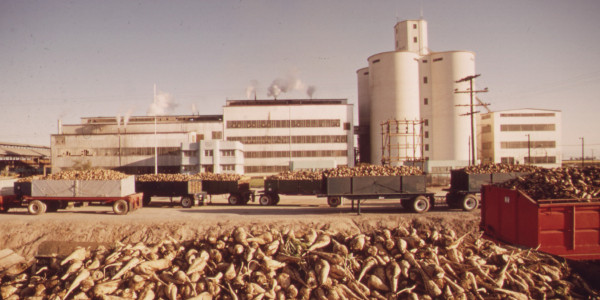SKIL in Beet Processing
The efficient operation of a beet factory depends on full attention being given to every detail from beet delivery to final despatch. SKIL is able to provide personnel with practical experience in all aspects of factory management and operation :
- beet cultivation and purchase
- process technology
- all engineering disciplines
- efficient by-product utilisation
- environmental impact
- commercial activities
The above disciplines can be applied equally effectively to both new and refurbishment projects.

Blah Blah Title
PROCESS
Although beet is physically different from its tropical counter-part, sugar cane, the factory processes are surprisingly similar. Two major differences are the lower juice colour levels with beet - which allows direct production of white sugar - and a cane factory's self-sufficiency in fuel.
Each beet factory is unique, with its own set of process problems to solve and with a particular market to satisfy. Each aspect of the process therefore needs to be considered :
Reception of beet directly affects factory economics because most beet growing is outside of the factory's control. Sophisticated sampling and analysis systems have been developed to determine the sugar and soil contents in each load so that accurate payment methods are applied and poor quality loads rejected.
Storage of beet at the factory will depend on climatic conditions but can require several weeks' supply where harvesting disruptions occur. Good storage and effective delivery scheduling is therefore imperative to the avoidance of sugar loss.
Extraction starts with washing before the beets are cut into chevron shaped slices and introduced to the diffuser. Diffusion is achieved with water at about 70 °C in a counter-current process and strict temperature control and hygiene is required in order to achieve efficient extraction.
Purification of diffusion juice is simplified by the relatively low colour levels. It is normally achieved using carbonatation with the addition of appropriate chemicals to minimise fouling of the subsequent concentration steps.
Crystallisation follows evaporation to a syrup. Because beet factories are not self-sufficient in fuel the evaporation is more optimised for steam efficiency than a cane factory. It is normal to adopt a three boiling pan system.
Curing, Drying and Storage are all critical to the process because the sugar is produced as the finished product. Centrifugation must therefore be very efficient, drying involves subsequent conditioning and storage must be to the highest quality if the products, usually produced in a relatively short campaign, are to remain market ready throughout the year. If necessary the product can also be screened.
Packaging is a topic in its own right: a typical factory will be capable of producing a range of sugars from icing through cubes to liquid products and a range of packages from 8 gm sachets to bulk road/rail tankers. A direct and thorough knowledge of the market requirements, including modern packaging arrangements, is critical to success.
CO-PRODUCT UTILISATION
Factory profitability often relies on the efficient utilisation of the molasses and animal feed co-products. The spent beet fibre can be processed into a variety of both wet and dry animal feed products. The molasses can either be sold on its own, used internally for alcohol production or blended with the fibre to make an enhanced feed product. The importance of the feed products to the factory is such that uniform, high quality products must be produced at all times.
SKIL SERVICES
Our specialists can help you investigate all aspects of the industry in order to :
- evaluate potential process improvements
- identify and implement capital projects
- develop your staff through appropriate training

